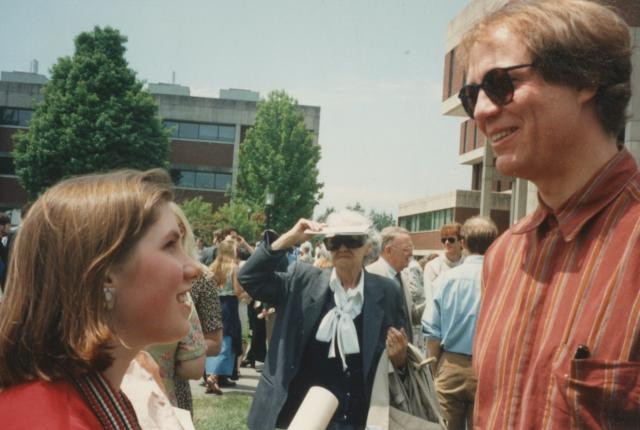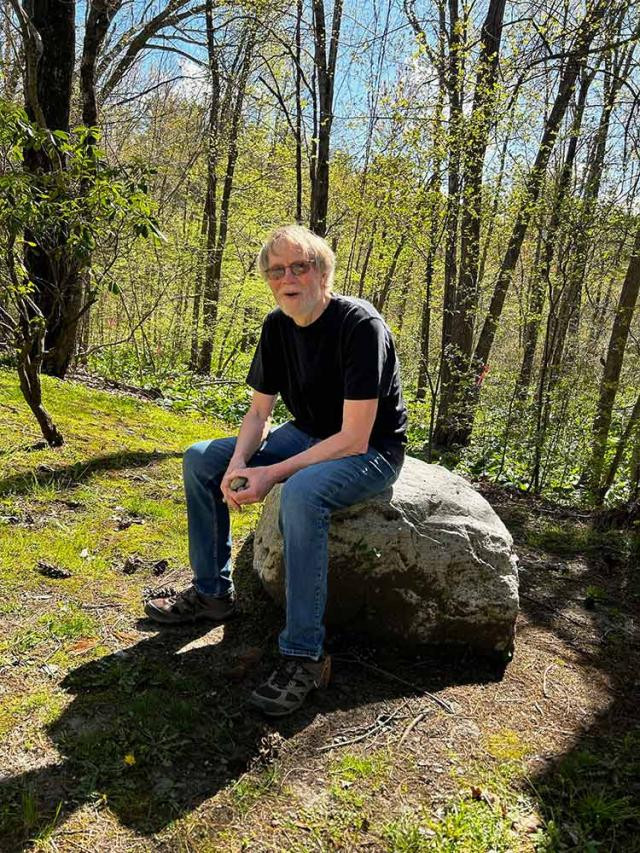Hampshire Remembers Longtime Professor of Philosophy and Religion Ken Bradt

Raymond Kenyon Bradt, who went by Ken, was a beloved faculty member who taught at Hampshire from 1973 to 1988.
The former assistant professor of philosophy and religion in what was once Hampshire’s School of Humanities and Arts died on February 10, 2025, at age 82.
Before joining Hampshire, Bradt taught at Earlham College as a Danforth intern and at the University of Virginia. He earned a B.A. in philosophy and an M.A. in theology from Notre Dame and an M.A. in philosophical theology from Yale. After leaving Hampshire, he earned a Ph.D. from Yale in philosophical theology.
“He was a brilliant teacher with an intelligence I’ve rarely met,” says graduate Bill Schockner 81F. “His classes were challenging — intense but exhilarating. We would have classes in the evening, and there were many times when the class would go well after midnight. His lectures were utterly absorbing and felt so profound. As my Div III advisor, he was exacting, but it was some of the best work I’ve done.“
Bradt taught at the College for 15 years. His lecture and seminar classes comprised close studies of major texts in Western and Asian philosophy and religion. In addition, he offered an interdisciplinary class he’d developed at the University of Virginia called The Divine Comedy of Man, which took its structure from Dante’s Divine Comedy. Through 20th-century literary and philosophical readings and film, the course traced a passage through despair, beginning in the hell of the Shoah; to a purgatory of suffering, struggle, and hope; and culminating in works reflecting the experience of joy.
“I first met Ken on a spring day when I wandered into his What Is Philosophy? class,” says alum Justin West 75S. “He was the kind of teacher that Hampshire’s original philosophy embraced: creative, inquiring, dedicated, and original. He would re-create philosophical thought right in front of students rather than lecturing about it. He was a real teacher who valued student learning above all else. We remained the best of friends for more than 50 years. I lack Ken’s eloquence to say what he meant to me. Suffice it to say that Hampshire and its students were privileged to have had the sun that was Ken Bradt shine upon them.”

Colleague and friend Professor Emeritus Robert Meagher remembers, “Co-teaching on numerous occasions with Ken and serving as his colleague for so many years was a rare privilege and joy. Ken and I were close friends since student days at Notre Dame almost 60 years ago. Ken's passing is a great loss to me and so many others who revered and learned from his deep learning and wisdom.”
Hampshire gave Bradt the keen pleasure of teaching students who delighted, as he did, in rigorous and imaginative intellectual exploration. He often prepared for class by walking in the hills above campus, carrying a volume of, say, Heidegger, or Aristotle, or Lao Tzu, rereading and rethinking.
“I took every course he taught. While I lived in NoHo for three years after graduating, I continued studying with Ken,” says alum David J. Stern 77F. “His mind was vast — and it was a mind filled with heart. It was also filled with an encyclopedic knowledge of the world’s wisdom traditions. He was an original and creative thinker. Sitting in a class with Ken, I felt held in that vast and warm mindspace. I’ve always said that Ken was the midwife to my thinking Self — a thinking Self that was, because of Ken’s midwifery, infused with spirit and heart. I’m so grateful to have had Ken as my teacher and mentor. He was my friend and, years later, the best man at my wedding.”
Bradt was known for his warmth, gentle manner, and reflective way of speaking; his lengthy advising sessions; his integrity and his independent spirit; and the mighty splash his 6'5" frame made when he dove into the pool and freestyled across.
“He was a kind, generous, and compassionate human being,” says Professor of Film Abraham Ravett. “At our Robert Crown Center, Ken taught me how to swim utilizing rhythmic breathing, suggested much appreciated dietary supplements, and with infinite patience introduced me to his work on Hegel.”
After he left Hampshire, Bradt taught in Yale’s summer school and then turned back to the dissertation he’d begun before teaching consumed his energies. In 1995, he finally completed his doctorate from Yale, with a dissertation on Hegel’s theology entitled Hegel’s Word “God.” The years following were spent with his partner of 32 years, Margaret Smith F70, in Alabama, Indiana, and Connecticut, where Smith taught English and he continued writing. In 2003, in the journal Soundings, Bradt published an article entitled “The Radical Christian Orthodoxy of John Milbank: The Historical Contextuality of Its Development.” He also left behind a handful of poems, an unfinished work of fiction, called “The Day Was Long in Coming,” and hundreds of pages of the central writing project of his life, an unfinished work of original theology titled The Discourse of the Divine Word / Ludus Theologicus / A Non-Theontological Articulation of the Divine Being of God: An Incarnational Theontology.
In his last eight years or so, Bradt lived with Alzheimer’s, and five years before he died, he and Smith moved back to Amherst. One of his greatest pleasures in this last chapter of his life was walking in the woods, where he delighted in the branches moving in the wind, the squirrels, the birds, the other walkers who would stop to chat, and the dogs he would pat and pat and pat.
Family and friends are invited to a celebration of Ken’s life, to be held on Sunday, June 29, 1-4 PM, at the Unitarian Universalist Society of Amherst, 121 N Pleasant St, Amherst MA. A program of remarks and readings will be followed by finger food, looking at photos, and visiting. If you would like to speak at the gathering, or play a musical instrument, please contact Margaret Smith at msmith4@bsu.edu. If you have a digital photo of Ken to share or would like to speak through a short video (less than 3 minutes), we’ll need that material by May 1. Please email Margaret (msmith4@bsu.edu), who will send you instructions on how to prepare and deliver your material.

Photographs courtesy of Margaret Smith 70F and Robert Meagher

